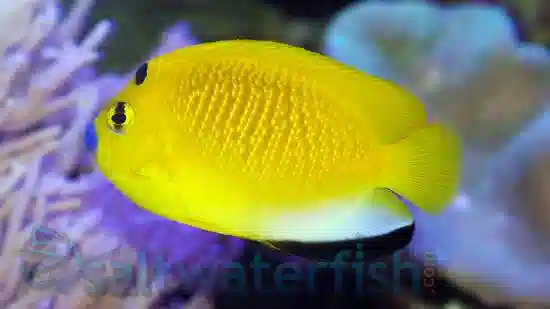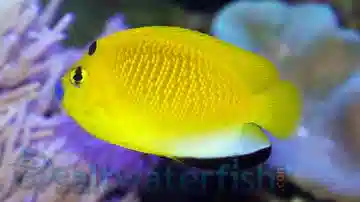Flagfin Angelfish
Apolemichthys trimaculatus
(1 Reviews)

Flagfin Angelfish
Apolemichthys trimaculatus
(1 Reviews)
{{ item.name }}
Size: {{ item.extra_field_3 }}
${{ getFormattedPrice(item.saleprice) }} ${{ getFormattedPrice(item.price) }}
To join the waiting list, click here
Free Shipping
With
$199.00
or more in Marine Life.
More details...
Flagfin Angelfish Care Facts
| Care Level: | Moderate |
|---|---|
| Temperament: | Semi-Aggressive |
| Diet: | Omnivore |
| Reef Safe: | No |
| Minimum Tank Size: | 120 gallons |
| Max Size: | 10 inches |
With its bright yellow body accented with an alluring purple mouth and prominent black spot on its forehead, the Flagfin Angelfish makes a captivating addition to any reef tank. Due to the presence of spots, it is also commonly called the three-spot angelfish. The Flagfin Angelfish should be housed in an aquarium with plenty of room to swim, and should be kept in a tank not less than 100 gallons. It grows up to 8 inches in the wild but is imported much smaller, and tends to cruise around in the lower portion of the tank, swimming in and out of caves. Since the Flagfin Angelfish may nip at corals and clams when hungry, it is considered reef safe but with caution. It is semi-aggressive in nature and is difficult to keep that is why it is only suggested for an experienced aquarist. The Flagfin Angelfish is considered extremely timid and can easily be stressed, but you can help it to acclimatize by providing sponges until it learns to eat new foods. It can be kept in a community tank and even mixed with other angelfish if the aquarium is large enough. The Flagfin Angelfish requires rockwork creating lots of caves for refuge, a lot of open swimming area, and tank mates that are peaceful. You can introduce live mysis shrimps or live brine shrimp to initiate a feeding response, and the prepared frozen foods with spirulina, foods with sponge material and algae sheets as well. It thrives well in a temperature range of 73-84 degrees Fahrenheit, pH of 8.0-8.4. It is compatible with tangs, large angels, large wrasses, lionfish, groupers and soapfish.
The Flagfin Angelfish (Apolemichthys trimaculatus): A Captivating Addition to Saltwater Marine Aquariums
Meet the Flagfin Angelfish (Apolemichthys trimaculatus), a marine marvel that graces your saltwater marine aquarium with its captivating presence. Thriving in the azure waters of the Indo-Pacific, this species adds a touch of fascination to the intricate tapestry of coral reefs, rocky formations, and coastal shallows.
Natural Habitat and Compatibility of the Flagfin Angelfish
The Flagfin Angelfish is naturally found in clear lagoons and outer reefs, where its distinctive appearance and alluring behavior blend harmoniously with the underwater surroundings. When evaluating compatibility within reef ecosystems, it's vital to consider their interactions with other species. Classified as not reef-safe, they tend to nip at coral polyps compared to other angelfish species.
Size and Lifespan of the Flagfin Angelfish
The Flagfin Angelfish boasts a stately size, typically around 12 to 14 inches. With a potential lifespan of up to 10 to 15 years, these charismatic creatures offer enthusiasts a long-term commitment to enhancing their marine aquarium.
Diet in Captivity of the Flagfin Angelfish
Ensuring the well-being of the Flagfin Angelfish involves replicating its natural diet. In the wild, they feast on a combination of sponges, tunicates, and other small invertebrates. In captivity, offering a balanced mix of high-quality marine pellets, enriched frozen foods such as mysis and brine shrimp, and occasional fresh seafood offerings closely mimics their nutritional needs.
Aquaculture and Availability of the Flagfin Angelfish
The Flagfin Angelfish is not widely aquacultured, and most individuals available to hobbyists are sourced from the wild. Opting for reputable suppliers that prioritize ethical collection practices and responsible handling ensures the health and vitality of these captivating specimens.
Compatibility with Other Fish and Invertebrates of the Flagfin Angelfish
Understanding the Flagfin Angelfish's temperament is vital when selecting compatible tank mates. Their peaceful demeanor and distinct appearance make them well-suited to coexist with various non-aggressive species with similar habitat preferences.
Temperament and Tank Requirements of the Flagfin Angelfish
The Flagfin Angelfish's elegant presence warrants a spacious environment. An aquarium with a minimum capacity of 120 gallons is recommended to accommodate their size and swimming habits. Aquascaping should incorporate ample hiding places and open areas for swimming, allowing these angelfish to display their natural behaviors.
Detailed Water Conditions for the Flagfin Angelfish
To ensure the optimal well-being of the Flagfin Angelfish, maintain the following water conditions:
- pH: 8.1 to 8.4
- Salinity: 1.020 to 1.025 specific gravity
- Water Temperature: 74°F to 80°F (23.3°C to 26.7°C)
- Water Flow: Moderate to strong flow to simulate their natural habitat.
Compatible Tank Mates for the Flagfin Angelfish
- White Tail Yellow Eye Tang (Ctenochaetus flavicauda)
- Blue Tang (Paracanthurus hepatus)
- Flame Angelfish (Centropyge loriculus)
- Coral Beauty (Centropyge bispinosus)
- Midas Blenny (Ecsenius midas)
Why Choose the Flagfin Angelfish from Saltwaterfish.com
Selecting the Flagfin Angelfish from Saltwaterfish.com signifies your commitment to introducing a captivating and visually striking marine inhabitant to your aquarium. As a reputable source for marine life, Saltwaterfish.com prioritizes the health and well-being of the species it offers. Through meticulous quarantine and acclimatization procedures, the Flagfin Angelfish arrives in prime condition, ready to elevate the allure and splendor of your marine ecosystem. Opting for the Flagfin Angelfish from Saltwaterfish.com reflects your dedication to excellence and meticulous care within your saltwater marine aquarium.
What a beautiful Fish! The images on the website do not do this marine life justice. The Flagfin Angelfish was hungry and ate right away.
Reviewed by: Maria Sloboken on Sept. 11, 2021








